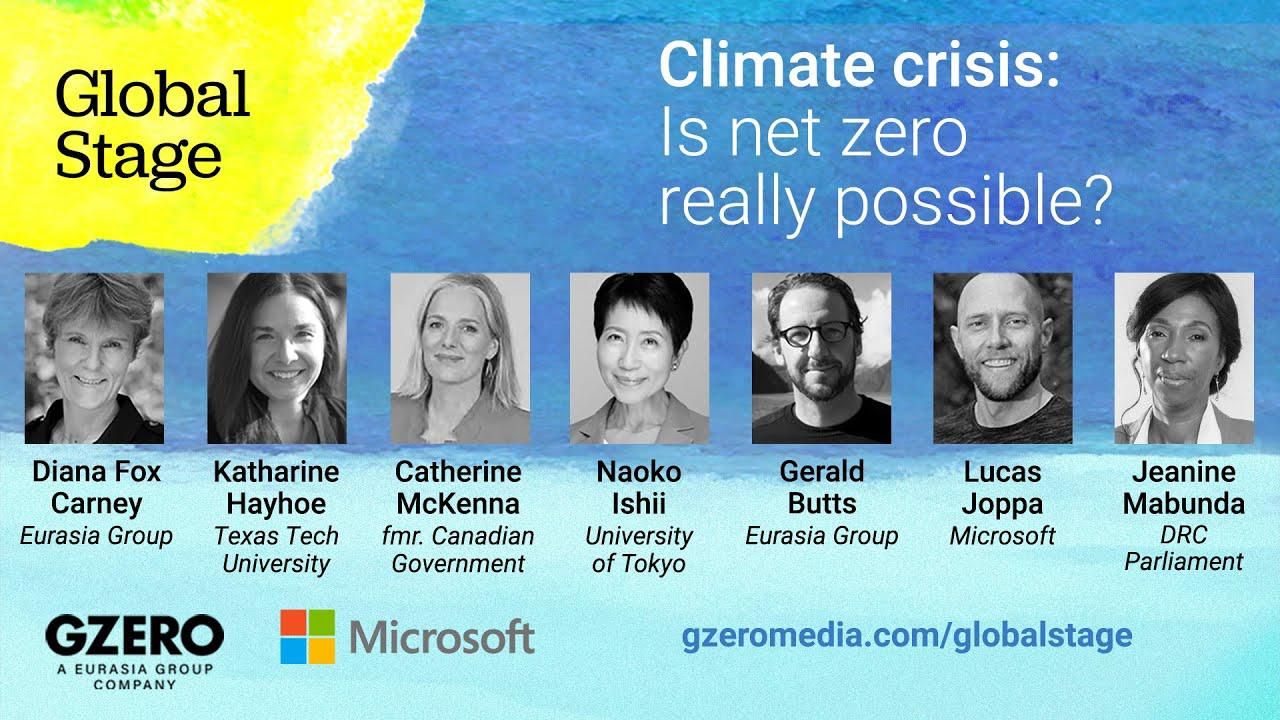Past Events
COP26 vibes so far: "What's it worth to save everything we have?"

COP26 Vibes So Far: ”What’s It Worth To Save Everything We Have? | Global Stage | GZERO Media

What's the state of play so far at the COP26 climate summit in Glasgow? Why is it so urgent to speed up climate action before it's too late? What does climate justice for developing nations really mean? And how can companies do their part without greenwashing? Several experts debated these and other questions during a Global Stage livestream conversation hosted by GZERO Media in partnership with Microsoft during the opening week of COP26, moderated by Eurasia Group senior adviser Diana Fox Carney.
Gerald Butts, vice chairman of Eurasia Group, explained the difference between climate justice and just transition to clean energy, and how the political debate on climate has moved to who's responsible to what we're going to do about it.
Atmospheric scientist Katharine Hayhoe, Chief Scientist at The Nature Conservancy and Director of the Climate Science Center at Texas Tech University., offered her thoughts on progress made since Paris 2015, why everything we do matters because climate is loading the dice against us, the need to set goals despite the human tendency to procrastinate, why we need to put value on climate because everything we have is worth saving, and why individuals should use their voices more than their actions to advocate for change on climate.
Naoko Ishii, Director of Center for Global Commons, and Executive Vice President of the University of Tokyo, detailed how we need to persuade the Japanese people to come up with a climate agenda they can own, and how to integrate the value of natural capital into economic decision-making by putting a price on carbon.
Microsoft chief environmental officer Lucas Joppa talked about why it's time for corporations to go from pledges to performance on climate action, why the private sector's role should be building climate solutions for the public sector, the importance of technology to move the needle on corporate sustainability, and why training the workforce in green skills should be a shared responsibility.
DRC member of parliament and former speaker Jeanine Mabunda Lioko discussed the paradox of a global green economy that'll still need a lot of raw materials from Africa, the facts and figures that illuminate the climate justice question, and why some climate goals are reachable for the continent — just not developing with only renewable energy.
Catherine McKenna, former Canadian minister of Infrastructure and Communities, spoke about the huge opportunity to scale up public-private partnerships on climate with blended finance, the need to track progress on top of disclosure to prevent greenwashing, and the right incentives for behavioral change on climate.Ian Bremmer sits down with former US Ambassador to NATO Ivo Daalder to unpack a historic shift in the transatlantic alliance: Europe is preparing to defend itself without its American safety net.
Think you know what's going on around the world? Here's your chance to prove it.
Argentina, Armenia, Belarus, Egypt, Indonesia, Jordan, Pakistan, Paraguay, Vietnam – to name only a few.
A poster featuring Andrew Mountbatten-Windsor, formerly known as Prince Andrew, is installed on a sign leading to the parking area of the Sandringham Estate in Wolferton, as pressure builds on him to give evidence after the U.S. Justice Department released more records tied to the late financier and convicted sex offender Jeffrey Epstein, in Norfolk, Britain, February 5, 2026.
British police arrested former Prince Andrew Mountbatten-Windsor today over allegations that in 2010, when he was a UK trade envoy, he shared confidential government documents with convicted sex offender Jeffrey Epstein.